Southwest Gas launches a pro-fossil gas social media influencer campaign
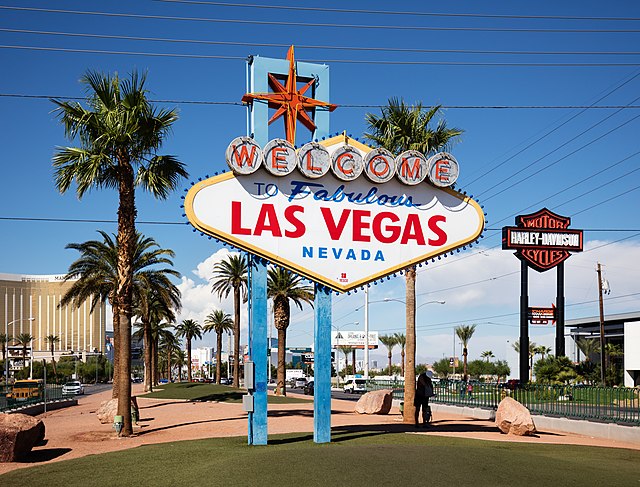
Facing pressure from policies to electrify buildings away from gas use, Southwest Gas appears to have launched a pro-fossil gas marketing campaign with paid social media influencers. The TikTok, Instagram, and Facebook posts identified by the Energy and Policy Institute fail to clearly disclose the utility’s involvement in the sponsored posts.
The marketing agency Ignite Media and its subsidiary Carusele are listed as the ‘promoters’ of the social media posts, which tout the benefits of fossil gas. The PR firm disclosed itself as the advertiser instead of its client for the sponsored posts – a practice at odds with guidance provided by the Federal Trade Commission. Most of the posts include link-shortened URLs that lead to the Southwest Gas website, but any viewers who do not click those would not see clues of the utility’s involvement.
In a one-minute TikTok post by lasvegasgal, Laci Cerrone, the account’s owner, reads out gas industry talking points while cooking eggs on a gas stovetop. Cerrone then proceeds to gush about her gas clothes dryer and a gas fireplace. That TikTok post does not include any link to Southwest Gas’s web site or otherwise name who paid for the ad. A similar Instagram post by Cerrone disclosed Carusele, an influencer marketing company owned by Ignite Media. Cerrone’s Instagram profile includes a link to the Southwest Gas website.
@lasvegasgal
Natural gas is clean and affordable.
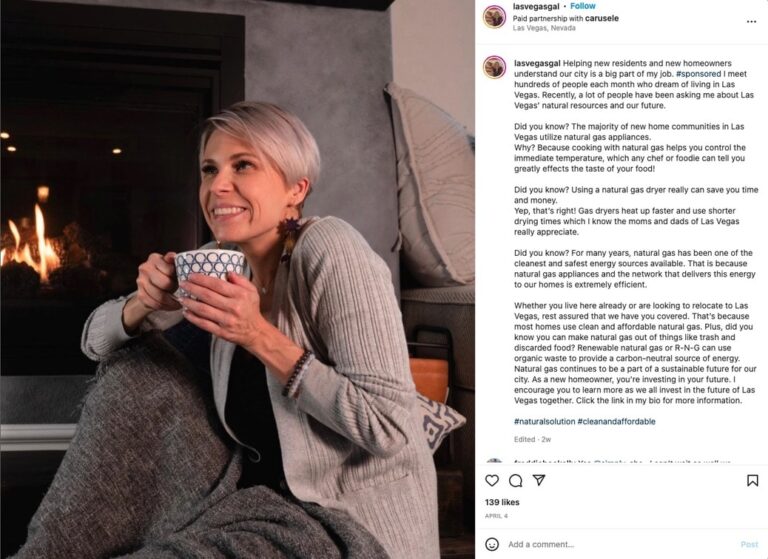
In a separate post, Lanny Chin, a chef in downtown Las Vegas, featured promotional gas content labeled #sponsored on his Instagram and Facebook pages, without specifying the sponsor. Chin highlights cost savings for restaurant owners, but fails to mention the mounting evidence that gas stoves produce harmful air pollution, increasing risks of respiratory and immune illness. Chin discusses the use of “renewable natural gas” or biomethane, and hydrogen blending as a means to achieve carbon neutrality with “our favorite flame,” though multiple studies affirm that neither RNG nor hydrogen make sense as a viable alternative to electrification for building decarbonization. Both RNG and hydrogen would lead to higher costs for customers, are not available at the scale necessary to decarbonize buildings, and do not resolve a host of pollution issues. Chin’s post includes a link to a different page on the Southwest Gas website than the one provided by Cerrone’s Instagram profile.
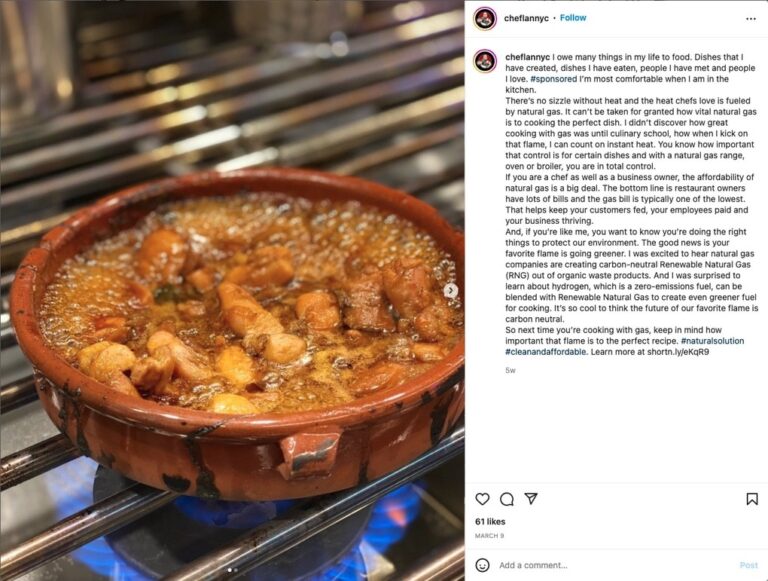
Ads continue pattern of social media greenwashing by utilities
Utilities and their trade associations have previously tapped social media influencers to promote fossil gas on social media platforms, such as Instagram. The American Gas Association (AGA), which primarily represents investor-owned gas utilities, hired a half dozen Instagram influencers in 2018 to make posts promoting gas stovetops. After Rebecca Leber first reported the marketing campaign for Mother Jones, nearly all of the influencers deleted their posts.
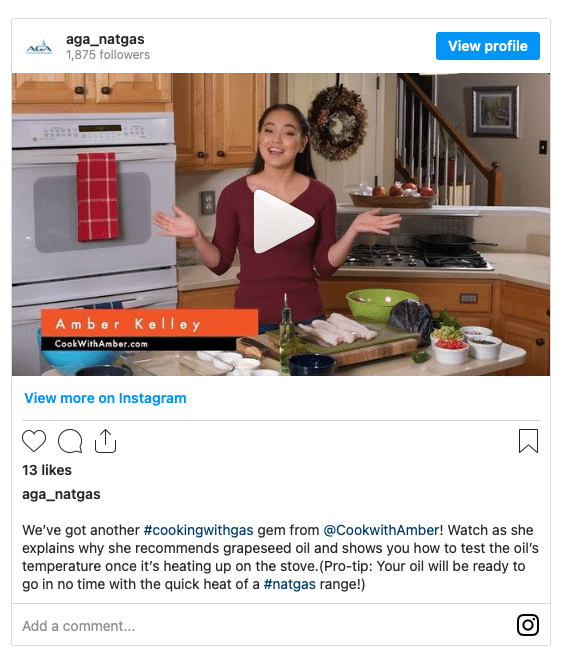
The American Public Gas Association (APGA), which represents municipal gas utilities, followed AGA’s lead and retained the PR firm Porter Novelli to hire influencers as part of its Natural Gas Genius Campaign. A single influencer, Kate Arends, was hired just before Porter Novelli dropped APGA as a client because the firm determined that the contract was “incongruous with our increased focus and priority on addressing climate justice.”
Ads greenwash methane gas as “sustainable”
All of the ads that EPI identified as being posted by Ignite Media or linking to Southwest Gas’s web site focus on methane gas being “sustainable or “green.” One advertisement on Facebook, posted by Ignite Media, focused on the affordability of gas and its significance for a sustainable future. However, methane – the primary component of either fossil gas or RNG – has a climate warming potential that is 84 to 87 times greater than carbon dioxide over a 20-year period. The recent UN IPCC report clearly states that cutting methane emissions is critical to having a chance to limit global temperature increases to 1.5 degrees celsius, and Nevada’s own greenhouse gas reduction goals align with that objective.
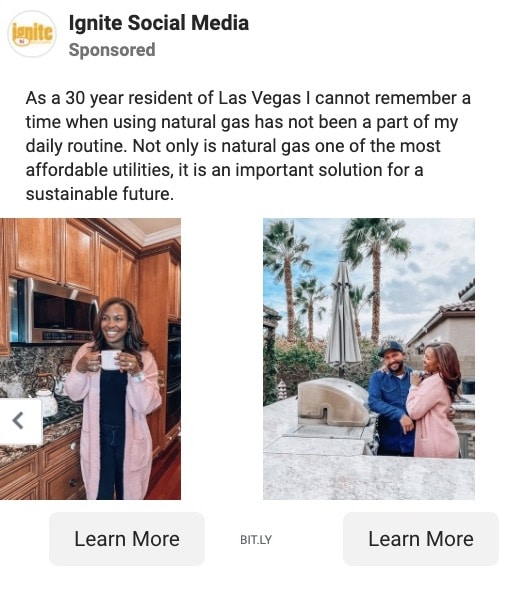
On Southwest Gas’s “Renewable Natural Gas” page linked by some of the posts, the utility states the need for a carbon neutral fuel source for “days when the wind isn’t blowing and when the sun isn’t shining.” The page features a video titled “The Promise of Natural Gas,” which claims that the use of natural gas has led to lower emissions nationwide. The “Why Natural Gas?” page features a video titled “A Sustainable Future with Natural Gas,” which is almost identical to the video on RNG, and touts Southwest Gas’s use of compressed natural gas for public transportation. The page mentions a partnership between Southwest Gas and Arizona State University to study hydrogen as a companion fuel source.
Las Vegas, served by Southwest Gas, is facing record heat, record drought and record population growth, warming faster than anywhere else in the U.S. and making decarbonization all the more urgent for the city. In Phoenix, the major Arizona city served by Southwest Gas, similar severe drought conditions and the growing frequency of record heat are requiring drastic and expensive measures to maintain a livable city.
Ads may violate FTC guidelines
By not disclosing the sponsor of the ads, all parties involved may be in violation of Federal Trade Commission guidelines. For social media influencers, the FTC requires disclosure of financial relationships with the brand, and specifies that the consumer must be able to see and understand the disclosure, meaning relationships are required to be “hard to miss.” Southwest Gas’s name does not show up anywhere on the pages of the influencers. Advertisers and endorsers are also “subject to liability for false or unsubstantiated statements made through endorsements.”
Featured image source: Wikimedia Commons,Thomas Wolf



